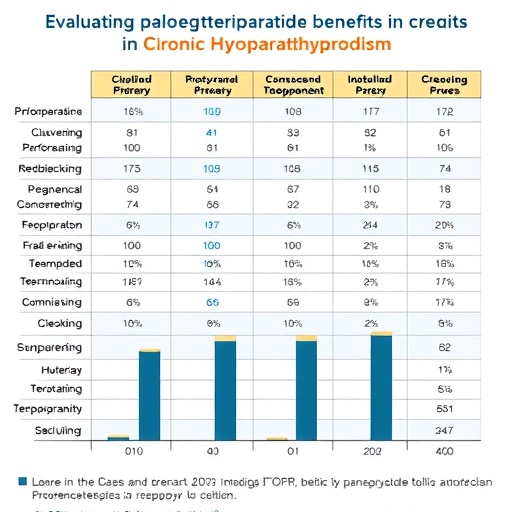In the rapidly evolving field of medicine, the management of chronic hypoparathyroidism has become a focal point of clinical research. Chronic hypoparathyroidism is a rare endocrine disorder characterized by the insufficient production of parathyroid hormone (PTH), which plays a vital role in regulating calcium and phosphate levels in the body. Patients suffering from this condition often experience debilitating symptoms, including muscle cramps, fatigue, and neurological issues. Traditionally, the treatment for this disorder has relied heavily on calcium and active vitamin D supplementation. However, the emergence of new therapies, specifically Palopegteriparatide, has opened up new avenues for managing this condition, bringing a wave of hope for patients and healthcare professionals alike.
Palopegteriparatide, a novel synthetic formulation of PTH, has shown promise in clinical settings, offering the potential to address the underlying issues of chronic hypoparathyroidism rather than merely alleviating symptoms. In a recent study conducted by a team of esteemed researchers, including Díez, Badia, and Abad, the value contribution of Palopegteriparatide was rigorously evaluated using a Multicriteria Decision Analysis (MCDA) approach. This methodology provides a structured framework for assessing the preferences and trade-offs that patients and clinicians must navigate when considering treatment options, ultimately leading to a more personalized approach to care.
The MCDA employed in this study captures a wide array of factors that are pivotal in treatment decision-making processes. By incorporating a variety of criteria, such as clinical efficacy, safety profiles, and cost-effectiveness, the researchers were able to create a comprehensive evaluation platform that reflects the multifaceted nature of health outcomes. Such thorough analyses are critical for healthcare providers striving to devise treatment plans that prioritize patient needs and optimize resource allocation in increasingly constrained healthcare environments.
In the study, the effectiveness of Palopegteriparatide was juxtaposed against traditional treatment modalities. The results underscored its superior potential in achieving optimal serum calcium levels and, importantly, mitigating the often unyielding symptoms associated with chronic hypoparathyroidism. With an increasing number of patients in need of effective treatment solutions, Palopegteriparatide serves as a beacon of hope, illuminating the path towards better health outcomes for those suffering from this debilitating condition.
Moreover, the implications of adopting Palopegteriparatide as a standard treatment are profound. The findings from Díez et al. suggest that this new therapy could significantly enhance the quality of life for patients, reducing the burden of daily symptom management. The holistic insights gleaned from the MCDA framework highlight not just the clinical advantages but also the emotional and psychological benefits of adopting a treatment that aligns with patient values and preferences.
Financial considerations also play a pivotal role in the adoption of new therapies within healthcare systems. The study meticulously examined the cost-effectiveness of Palopegteriparatide, comparing its overall economic impact with existing treatment regimens. As healthcare costs rise globally, elucidating the financial implications of new therapies is vital. The results indicated that although the initial costs of Palopegteriparatide might be higher, the long-term savings from reduced hospitalizations and complications could outweigh these expenses, making it a worthwhile investment for healthcare providers.
In addition to the clinical and economic assessments, the researchers emphasized the importance of stakeholder engagement in the MCDA process. By incorporating input from patients, caregivers, and healthcare professionals, the analysis reflects a well-rounded perspective on treatment preferences. This collaboration is essential in fostering a healthcare environment that prioritizes patient-centered care, empowering individuals to make informed decisions about their health.
The innovative application of MCDA in this study not only enriches the field of chronic hypoparathyroidism management but also sets a precedent for other areas of medicine where treatment options are complex and multifactorial. The methodology can serve as a template for future research endeavors aimed at elucidating the multifaceted nature of therapeutic decisions in various medical domains.
As the medical community looks to the future, the findings concerning Palopegteriparatide underscore the necessity for ongoing research and the development of new therapies that can address unmet clinical needs. The dynamic landscape of healthcare is shifting toward a more integrated approach that prioritizes patient experiences, quality of life, and clinical outcomes.
Furthermore, the comprehensive results demonstrated in the study hold considerable potential for influencing clinical guidelines and policy-making in the realm of endocrinology. Embracing therapies like Palopegteriparatide could lead to paradigm shifts in the way chronic hypoparathyroidism is treated, ultimately benefiting countless individuals burdened by this challenging condition.
In conclusion, the study authored by Díez, Badia, and Abad contributes invaluable insights into the management of chronic hypoparathyroidism. The Multicriteria Decision Analysis methodology not only provides a nuanced understanding of patient preferences and treatment effectiveness but also lays the groundwork for future innovations in therapy. Palopegteriparatide heralds a new era in the treatment of this disorder, blending clinical advancement with patient-centered principles, and emphasizing the importance of holistic care in today’s healthcare ecosystem. As research continues to expand upon these findings, the hope remains that more effective treatments will emerge to enhance the lives of those navigating the complexities of chronic hypoparathyroidism.
Subject of Research: Chronic Hypoparathyroidism
Article Title: Value Contribution of Palopegteriparatide in Adult Patients with Chronic Hypoparathyroidism using Multicriteria Decision Analysis (MCDA)
Article References:
Díez, J.J., Badia, X., Abad, R. et al. Value Contribution of Palopegteriparatide in Adult Patients with Chronic Hypoparathyroidism using Multicriteria Decision Analysis (MCDA). Adv Ther (2025). https://doi.org/10.1007/s12325-025-03396-0
Image Credits: AI Generated
DOI: 10.1007/s12325-025-03396-0
Keywords: Chronic Hypoparathyroidism, Palopegteriparatide, Multicriteria Decision Analysis, Patient-Centered Care, Healthcare Economics, Clinical Efficacy, Quality of Life.




